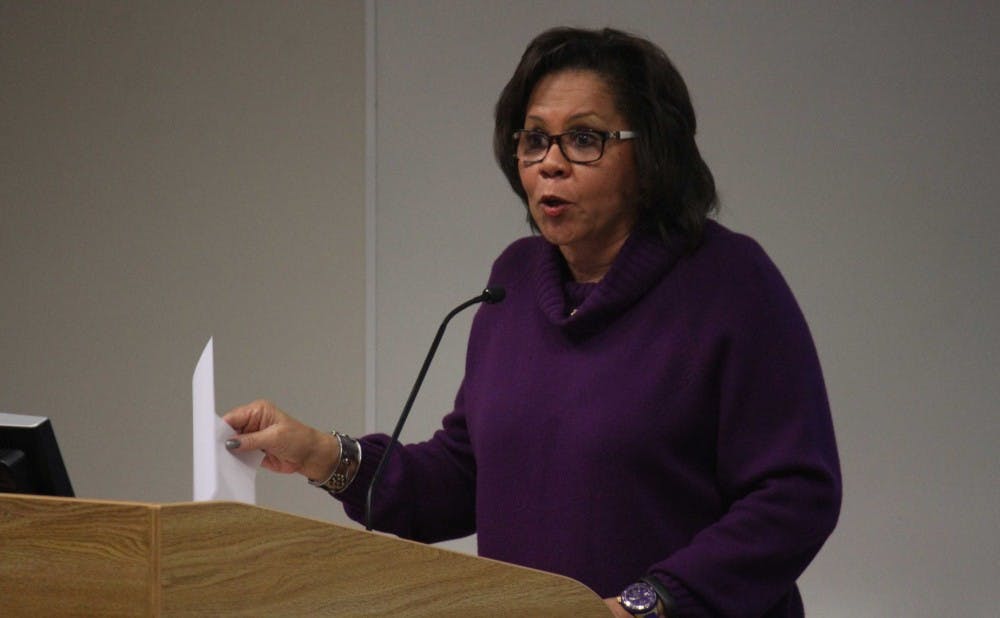As the number of master's programs offered by the University has increased, so have questions about the purpose and value of a Duke master's degree.
Graduate School Dean Paula McClain spoke about the impact of master's degrees to the Academic Council Thursday. The topic has come into the limelight at several points over the last few years, particularly Fall 2013, when the Council approved five new master's programs. As more master's degrees have been introduced, several faculty members have voiced concerns that neither the approval process for new degrees nor the review process for existing ones is sufficiently strict—with others wondering how valuable the degrees truly are for students.
"Our hope is that this report will serve as the jumping-off point for a broader faculty discussion on master's degrees," McClain said of the data she presented Thursday, noting the need for leadership from President Richard Brodhead and Provost Sally Kornbluth in helping to determine next steps.
The University's number of master's students has increased by 51 percent in the last decade, McClain said. The majority of the growth has not come from students enrolling in new programs, however—two-thirds of the new students came from existing programs growing larger.
Half of the growth has come in the form of international students. McClain noted, however, that a significant majority of that growth has come from just two countries, China and India. This growing student population has raised questions about how the University allocates its resources to master's programs—in terms of both academics and student life.
McClain and her team spoke with services such as the International House, Counseling and Psychological Services and the Career Center, among others, to help determine the impact of the growing student body on the University.
"We need to have better processes for understanding their needs and addressing areas where we could do a better job of serving them," McClain said. "Master's students are only here for two years. For international students, that means it's very, very difficult for them to become oriented and integrated into the community."
The practical value of Duke's master's degrees was also examined. Though degrees in engineering and the natural sciences were almost universally described as relevant, the response for degrees in the humanities and social sciences was not as positive.
In order to ensure that master's students are in a position to receive the best academic experience possible, McClain and her team recommended that the University develop better processes to review—and if necessary, discontinue—master's programs.
Other recommendations included increasing student support services and doing more research into why Duke has added new programs at such a comparatively high rate.
"One of the things that we know we need to avoid—which I think we've done in the past—is the assumption that if we offer it, people will come," McClain said, noting that some of the newer programs have not seen the expected number of applicants.
Several faculty members brought up the economic impact of the degrees. Kerry Haynie, associate professor of political science, questioned the consequences of more master's students at a time when departments are still being asked to tighten their budgets and cut faculty.
"In reality, the driver in both cases is the same—it's the economic reality of what each program can support," Kornbluth said.
In other business:
President Brodhead delivered his annual address to the faculty, focusing on three topics that are "not strictly academic, but not easily separable from the academic"—healthcare, athletics and town-gown relations.
Brodhead took a historical approach, noting Duke's tradition of dedication to each of the three. At present, he noted, the University faces a notable juncture in each topic.
As the economics of healthcare evolve, questions are being raised on the position of academic medicine, Brodhead said—noting that Duke's commitment to medical research and the role of the School of Medicine is strong, both ideologically and financially.
In terms of athletics, as the NCAA's most powerful conferences consider proposals that would change the role of athletes, Duke will continue to stand by a system emphasizing the "student" in student-athlete, he said.
Finally, as Durham continues its revitalization of the past two decades—economically, artistically, industrially—Duke will remain a committed partner, Brodhead said.
"We can glimpse a Durham that never was—but certainly can be—as it comes into being," Brodhead said.
Get The Chronicle straight to your inbox
Signup for our weekly newsletter. Cancel at any time.

